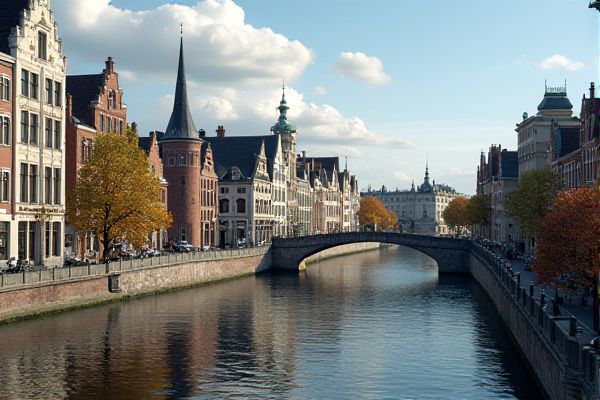
Education system and best schools in Belgium: Education stages: Pre-primary to secondary. Compulsory education: Ages 6-18. Tri-language instruction: Dutch, French, German. State-funded and private schools available. International schools for expats: Brussels, Antwerp. Renowned universities: KU Leuven, Ghent University. School year: September to June. Diverse curriculum options: STEM, arts, humanities. PISA high achievers: Strong math and science scores. Enrollment: Contact local municipality for details.
Education stages: Pre-primary to secondary.
In Belgium, the education system encompasses pre-primary education for children aged 2.5 to 6 years, followed by six years of primary education. Secondary education, lasting six years, is divided into three stages: the first cycle focuses on general education, the second cycle increases specificity, and the third cycle prepares students for higher educational or vocational paths. Both primary and secondary [education](https://www.belgiumeducation.info/education-system/belgium-education-system.html) are free, offering diverse types of schools such as General Secondary Schools, technical, and vocational institutions. This structured approach ensures that Belgian students receive a comprehensive and effective learning experience throughout their formative academic years.
Compulsory education: Ages 6-18.
In Belgium, Compulsory Education begins on 1 September of the calendar year in which a child turns five and persists until the child reaches 18 years of age, or until the student earns a diploma of secondary education. There are flexible options for students ages 15 or 16, allowing them to combine part-time learning with working opportunities. For more detailed information, you can visit the Compulsory Education page on the official Vlaamse Government website.
Tri-language instruction: Dutch, French, German.
In Belgium, the education system is characterized by its rich linguistic diversity, with compulsory foreign language instruction starting in the 3rd year of primary school. Students in different regions learn Dutch, French, or German, with varying hours dedicated to language instruction, and bilingual education options are available, especially in the Brussels-Capital Region.
State-funded and private schools available.
In Belgium, the education system includes state-funded and private schools, with options such as community schools, subsidized public and private schools, and fee-paying private schools, including international schools. These institutions vary by region and language community, offering a range of educational philosophies and curricula, including neutral state education, religious schools, and schools with distinct educational philosophies like Montessori schools.
International schools for expats: Brussels, Antwerp.
International schools in Belgium, particularly in Brussels and Antwerp, offer expat families a range of educational options, including the International Baccalaureate, British, and American curricula. These schools provide a multicultural environment, small class sizes, and a wide range of extracurricular activities. Although these benefits are attractive, they often come with higher tuition fees and strict entry criteria. For more detailed information, you can visit the International Schools in Belgium page, which provides insights into the educational landscape and options available for expatriate families.
Renowned universities: KU Leuven, Ghent University.
KU Leuven, ranked joint 63rd globally, is Belgium's oldest and highest-ranked university, founded in 1425, with a strong focus on research and international students. Ghent University, ranked 169th globally, is another prominent institution, known for its engineering, technology, and life sciences programs, and is the first Dutch-speaking university in Belgium, established in 1817.
School year: September to June.
The education system in Belgium is compulsory from age six to 18, with the academic year running from September to June. The country has three national education systems corresponding to the French, Flemish, and German regions, along with private and international schools, such as the International School of Brussels and St. John's International School, which offer diverse educational options.
Diverse curriculum options: STEM, arts, humanities.
The Belgian Education System offers diverse curriculum options, including STEM fields through General and Technical Secondary Education, arts through Artistic Secondary Education (KSO), and humanities through various tracks in secondary education, catering to different student interests and career aspirations. Additionally, international schools like the International School of Brussels and St. John's International School provide IB programs and other curricula that include a broad range of subjects. For more insights and interesting facts, visit the Belgian Education System on the Care Force website.
PISA high achievers: Strong math and science scores.
In Belgium, despite recent declines, the Flemish Community schools have historically performed better in math and science, with scores above the OECD average. However, the latest PISA 2022 results show an unprecedented drop in performance, particularly in math, though Flanders still outperforms the French-speaking schools.
Enrollment: Contact local municipality for details.
To enroll a child in a school in Belgium, parents must contact the local municipality within the first 60 days of registration, providing documents such as proof of identity, residence visa, vaccinations, address, and previous academic records. For more detailed information, you can visit the Education in Belgium page on Expatica.
